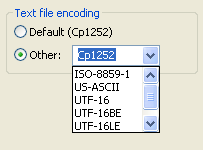Text file encoding
If your plug-in reads text files, it should honor the text file encoding
preference in the workbench.

Text files are encoded differently depending on the platform and the
locale. Most of the time, using the default text file encoding for the
locale of the host operating system is good enough. However, a user may
want to work with text files that originate from another source. Given the
ability to use the platform in a networked team environment, it's certainly possible
that users will want to work with text files that use a different encoding
scheme than their native encoding scheme so that they can easily interchange
files with another team.
For this reason, the workbench defines its own encoding profile that is specified
by the user in the Preferences dialog. Users may choose from the
preference page or type in their own encoding. Plug-ins that interpret
text files, such as editors and builders, should consult the workbench encoding
preference rather than assume that the installed operating system encoding is
in use.
You can obtain the encoding preference using
ResourcesPlugin.getEncoding().
This encoding should be passed to java.io readers instead of using
the default system encoding. If you need to track changes to this preference, you can hook a listener on
the
ResourcesPlugin
preferences and react to changes in ResourcesPlugin.PREF_ENCODING. The
following example comes from the default text editor:
public void initialize(StatusTextEditor textEditor) {
fTextEditor= textEditor;
fPropertyChangeListener= new Preferences.IPropertyChangeListener() {
public void propertyChange(Preferences.PropertyChangeEvent e) {
if (ResourcesPlugin.PREF_ENCODING.equals(e.getProperty()))
setEncoding(null, false);
}
};
Preferences p= ResourcesPlugin.getPlugin().getPluginPreferences();
p.addPropertyChangeListener(fPropertyChangeListener);
fEncodingActionGroup= new EncodingActionGroup(fTextEditor);
fEncodingActionGroup.update();
}
Users may also change the encoding for a particular file in the Edit >
Encoding menu of an editor. If you are manipulating text inside an
open editor, you should use
IEncodingSupport.getEncoding()
instead in order to get the encoding for the particular editor. The
following example shows how to obtain this information from an editor:
IEncodingSupport encodingSupport = (IEncodingSupport) editor.getAdapter(IEncodingSupport.class);
String encoding = encodingSupport.getEncoding();
